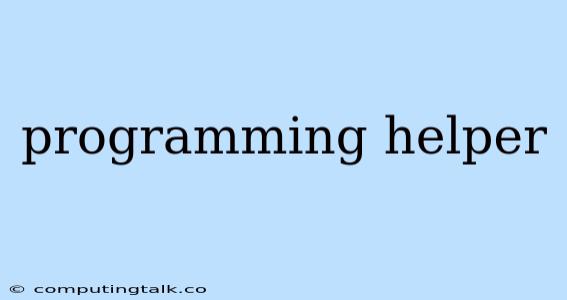What is a Programming Helper?
A programming helper is any tool, resource, or technique that assists developers in writing, debugging, and maintaining code. In essence, they are your companions in the often complex and challenging world of programming. From simple online code editors to sophisticated IDEs (Integrated Development Environments), programming helpers come in many forms, each tailored to specific needs and preferences.
Why Use Programming Helpers?
Here are some key reasons why programming helpers are invaluable for programmers of all skill levels:
- Increased Efficiency: Programming helpers automate repetitive tasks, like code formatting and syntax checking, freeing up developers to focus on the creative and strategic aspects of programming.
- Reduced Errors: These tools help identify and prevent common coding mistakes, resulting in more robust and reliable software.
- Enhanced Productivity: With features like code completion and intelligent suggestions, programming helpers significantly boost coding speed and output.
- Improved Code Quality: By providing code analysis, refactoring tools, and best practices guidance, programming helpers contribute to clean, maintainable, and efficient code.
- Easier Learning: Programming helpers act as valuable learning resources, offering documentation, tutorials, and interactive exercises to help developers grasp new concepts and technologies.
Common Types of Programming Helpers:
1. Code Editors and IDEs:
- Code Editors: These basic text editors offer syntax highlighting, auto-completion, and basic debugging features. Examples include Sublime Text, Atom, and VS Code.
- IDEs (Integrated Development Environments): More advanced than code editors, IDEs integrate various tools within a single interface, providing a comprehensive development environment. Examples include IntelliJ IDEA, PyCharm, and Eclipse.
2. Debugging Tools:
These tools assist developers in identifying and fixing errors in their code. Common features include breakpoints, stepping through code execution, and viewing variable values.
3. Version Control Systems:
These systems track changes made to code over time, allowing developers to revert to previous versions, collaborate with others, and manage branches of code. Examples include Git, Mercurial, and SVN.
4. Libraries and Frameworks:
These collections of pre-written code offer reusable functionalities and components, simplifying development by providing readily available solutions for common tasks.
5. Online Resources:
Websites and platforms like Stack Overflow, GitHub, and CodePen offer vast repositories of code examples, solutions to common problems, and communities of developers for support and collaboration.
Choosing the Right Programming Helper:
The best programming helper depends on individual needs and preferences. Consider factors such as:
- Programming Language: Different tools and resources are designed for specific programming languages.
- Project Complexity: Choose a helper that matches the complexity of your project.
- Personal Preferences: Consider factors like interface, features, and learning curve.
Conclusion:
Programming helpers are essential for modern software development. They empower developers to write better code, work more efficiently, and overcome challenges more effectively. By leveraging the right tools, programmers can unlock their potential and create exceptional software solutions.
